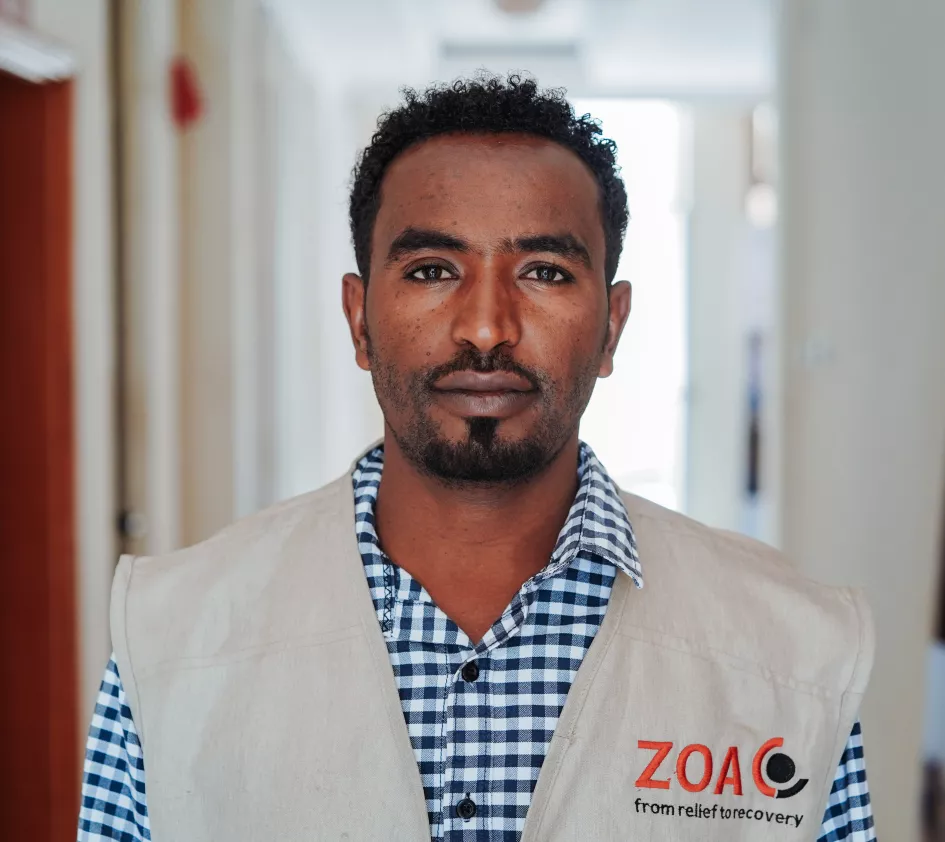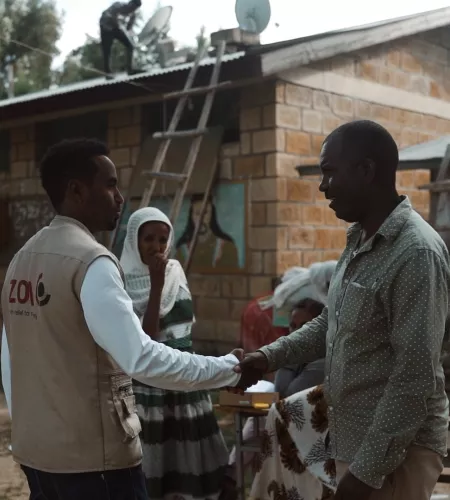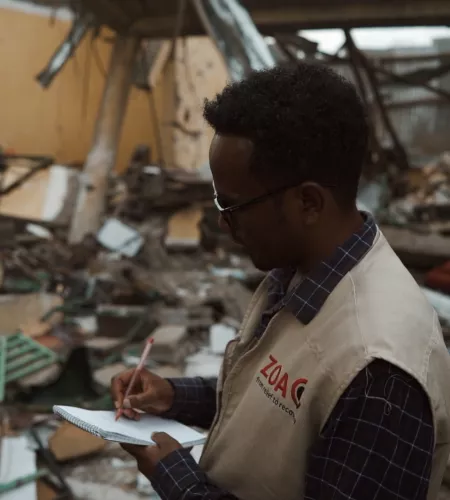“Horrific.” As for Meles Gebremariam, there is only one word that describes the war in Tigray. Hundreds of thousands of people from his province died during the bloody conflict, which was fought between the national and regional army between November 2020 and November 2022.
More than 2 million people fled; many were traumatized. Many displaced people are still staying in shelters in schools, health centres and other public buildings. “No one expected such massive destruction,” he says.

‘I am lucky to be able to contribute something to my people’
For two years he provided emergency aid in a war zone: his own province, Tigray. The Ethiopian Meles Gebremariam (39) is grateful that he was able to be there for his people. “No one expected such massive destruction.”
Meles Gebremariam provides emergency aid in Tigray
Moving on, between hope and uncertainty
There was no electricity and hardly any communication. Banks were closed and food and medicine did not enter Tigray. From November 2020 to November 2022, the Ethiopian province was at war, completely cut off from the outside world. ZOA employee Meles Gebremariam (39) was there, and stayed there. “I am lucky to be able to contribute something to my people.”
Lucky
Meles had a quiet, happy childhood in the semi-autonomous Ethiopian province. For study and work he lived in other parts of the country for a number of years. He returned to Tigray, where he found work as a regional coordinator for Digital Green Foundation, an international aid organisation focused on agricultural development.
“When the war broke out, the organisation immediately had to stop all work,” he says. “So I lost my job. Just like my two brothers and sister, who work in education. All schools and universities in Tigray were closed for two years.”

Meles saw the immense humanitarian suffering the war was causing around him. With a background in disaster risk management, he developed a strong desire to do something for his fellow Tigrayans - on behalf of a humanitarian organisation.
“I was lucky,” he says. “ZOA was already working in Tigray and opened a new office in Mekelle, the city where I live, to provide emergency aid to the victims of the conflict. I was one of the first colleagues to be hired as an emergency aid coordinator.”
Drone attack
As a ZOA employee, Meles was able to bless many people. As best he could, he tried to run a number of projects aimed at meeting the greatest needs.
More than 70 percent of the region's water points were destroyed; ZOA provided repairs and trucks with water. In the shelters, ZOA provided blankets and household materials. Farmers who had lost everything were given new tools to work their land.
It wasn't all easy – at all. “It was dangerous and sometimes impossible to travel in the region,” says Meles. “There were checkpoints everywhere. Sometimes we got a gun pointed to our head while we were moving to reach the people in need and we forced to get back to home without doing anything.” It was also not safe at home: an armed drone came down 40 meters from his house. Meles's wife broke her hand when she fell down the stairs, fleeing the attack.
Share salary
“I was traumatized by the situation,” he says. “And that, while I still had food to eat and my wife and daughter were in relative safety.” Every day he saw children on the street dying of hunger. Mothers begging for bread for their children. People who died from lack of medicine. “One of my relatives died of kidney failure. That would never have happened with medicine.”

Yet Meles's gratitude prevails for what he was able to do for his people during the war. Also for his own family. He shared the salary he received from ZOA with four other families: that of his two brothers, sister and parents. “ZOA's salary was a great blessing for all of us. We could continue to feed our children with it.”
It was not easy to get those salaries paid. This was done through risky trips with cash, because the banks in Tigray were closed. “No one could access their money,” says Meles. “Even rich people with a lot of money in their account were starving to death.”
Resilient
Since the ceasefire in November 2022, it has become easier for Meles and his teammates to travel around Ethiopia. But certain areas in Tigray are still not accessible. “The conflict is still not completely over,” he says. “Terrible things are happening in some places, even today.”
The need in the region is huge, he says. ZOA's help is therefore desperately needed. “The problem is that there are so few funds available for the work we do here. That's very frustrating. I hope that the international community will contribute to rehabilitation, but also to peace in Tigray.”
Between hope and uncertainty, Meles and his teammates continue to help people in Tigray wherever they can. “The Tigrayans have a strong work culture and good social networks,” says Meles. “People are extremely resilient. As soon as stability is restored, this region will quickly recover with a little help.”
